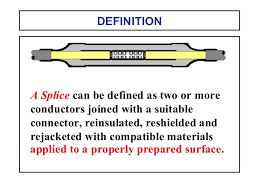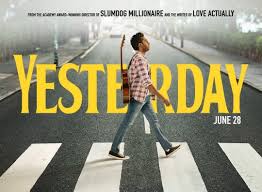 This spoonful covers the #1 source of most comma drama: THE COMMA SPLICE. Here's the definition: when two complete sentences are connected with a comma. That, my friends, is a gigantic no-no! (P.S.: The image defines a different kind of splice!) Let's start with two complete sentences: (1st) Jody loved to walk the backwoods trails with her dog. (2nd) They walked almost every day. To create a dreaded comma splice, chunk those sentences together with a comma: Jody loved to walk the backwoods trails with her dog, they walked almost every day. Since that doesn't work, what does? There are THREE correct choices! CHOICE#1: Using periods Jody loved to walk the backwoods trails with her dog. They walked almost every day. CHOICE #2: Using a comma + a FANBOY Jody loved to walk the backwoods trails with her dog, and they walked almost every day. CHOICE: #3: Using a semicolon Jody loved to walk the backwoods trails with her dog; they walked almost every day. For more details about FANBOYS and proper semicolon usage, check out these earlier spoonfuls: Spoonful #9: MEET THE FANBOYS Spoonful #10: FANBOYS STRIKE AGAIN Spoonful #7: SEMICOLONS SPEAK OUT I hope you found this spoonful useful and easy to understand. In my humble opinion, brushing up on grammar, vocabulary, and punctuation is a great thing to do when stuck at home. Stay safe, everybody! I'll be back next Sunday with a new spoonful. Sincerely, Laura Fineberg Cooper
6 Comments
 EVERYDAY and EVERY DAY are related but not interchangeable. But don't just take my word for it ... the goal of this spoonful is to prove my point with easy-to-understand examples. There's even a little challenge at the end! EVERYDAY is an ADJECTIVE that means average, common, or something that's used, seen, or done 7 days of the week. You can put EVERYDAY in front of nouns like uniform, shoes, and life. Here are some sentences: Meredith's everyday uniform consists of jeans and a sweater. Jeremy's everyday shoes are looking worn out. Reading, walking the dog, and making meals for my family are all part of my everyday life. EVERY DAY split into two words is a NOUN referring to 7 days of the week and answering the question, "When?" Now I'll amend the previous sentences to substitute EVERY DAY for EVERYDAY. Jeans and a sweater are Meredith's at-home uniform every day. The shoes Jeremy wears to school every day are looking worn out. I read, walk the dog, and make meals for my family every day. I'll leave you with a challenge: can you think of words starting with "ANY" that work the same way? Stay safe, stay healthy, and stay home as much as possible. Sincerely, Laura Fineberg Cooper A Spoonful of Grammar  SIGHT, SITE, CITE are HOMOPHONES, tricky words that sound (PHON) the same (HOMO) and love to create confusion. To clear your confusion in the shortest, sweetest way possible, this spoonful contains definitions, example sentences, and related words for each. Enjoy! SIGHT = (n.) something that you see or observe; (v.) to catch a glimpse of *** When at last we meet again, you will be a sight for my tired, lonely eyes! *** I caught sight of you peering through the window when I drove by your house. Related words: eyesight, sightseeing, oversight SITE = (n.) a location, a place; (v.) to place in a certain location; placed; located *** That's the site of the proposed playground. *** Our house was sited a bit too close to wetlands. Related words: website, situation, situate CITE = (v.) to quote, praise, or summon (to court) ***Make sure to properly cite your sources in your papers. ***Mr. Jones was cited in the Sunday paper for his heroic deeds. ***Three youths were cited to appear in court as a consequence of their misdeeds. Related words: citation, recite, recitation That's a wrap! I hope I've cleared your confusion. For other tricky homophone duos and trios, check out the following linked Spoonfuls: #20 - Homophone Fun; #26 - End Past/Passed Confusion and #34 - Peek, Peak, and Pique. Stay safe, everyone! Thank you for reading A Spoonful of Grammar. Sincerely, Laura Fineberg Cooper  "Mother, may I watch a movie?" "Yes, darling, that’s a splendid idea. If I finish up my work, I might be able to join you!" MAY and MIGHT: They seem interchangeable. But are they? Let's examine them together. MAY is a polite way of expressing hope and desire to do something. It is also appropriate when the chance of something happening is more likely than not. **May I stay up all night, pretty, pretty please? (hope and desire) **I may have dinner on the table by 6:30. (strong likelihood) With grammar, everything depends on sentence construction. If you start a sentence using may, don't switch to might mid-sentence. In the following sentences, the speaker should be feeling more than 50% optimistic that he/she will see the movie or attend the dance. **There's a chance I may make the movie on time, but there's a chance I may not. **I may or may not go the dance. MIGHT expresses a greater than 50% likelihood that whatever you're saying won't happen. Consider this sentence: **I might let you go, but we'll have to discuss it further. Why shouldn't you use MAY when doubt is present? It can be misleading, that's why. Let's look at the following example: **Zima may not use Yaya's bike. What's wrong with that? It sounds like Zima can't use Yaya's bike ever. Now let's change to MIGHT. **Zima might not use Yaya's bike. That indicates she has another transportation option to consider, not that she's forbidden from using Yaya's bike. Phew! That was tricky, even for me! Now let's cover another aspect of these words: VERB TENSES! MAY is present tense; MIGHT is past tense But both are used to indicate the likelihood of something occurring in the future! Fortunately, only MIGHT is used to reflect on something that occurred in the past. Here are two examples: **If Mary had studied harder, she might have done better on the test. **I fear that I might have overbaked the brownies, but I hope they're still enjoyable. P.S. If you're looking for an uplifting, original movie to watch, I highly recommend YESTERDAY - you MAY become a Beatles fan if you aren't one already. Please accept my deepest hopes and prayers for your continued safety. Sincerely, Laura Fineberg Cooper A Spoonful of Grammar |
Welcome to
|
 RSS Feed
RSS Feed
